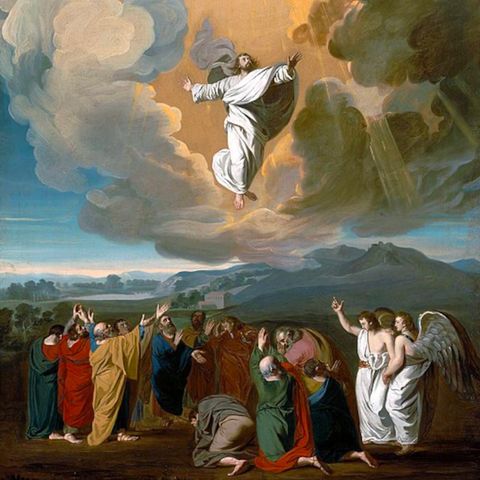May 9 or 12, 2024: Ascension Of The Lord

Scarica e ascolta ovunque
Scarica i tuoi episodi preferiti e goditi l'ascolto, ovunque tu sia! Iscriviti o accedi ora per ascoltare offline.
Descrizione
The Ascension of the Lord c. 33 A.D. Depending on ecclesiastical jurisdiction, the Thursday which falls forty days after Easter, or the Seventh Sunday of Easter Solemnity; Liturgical Color: White...
mostra di piùc. 33 A.D.
Depending on ecclesiastical jurisdiction, the Thursday which falls forty days after Easter, or the Seventh Sunday of Easter
Solemnity; Liturgical Color: White
Ecce Homo...in all His glory
The heart-piercing flash of a second when the wife’s eyes lock with her husband’s as she steps into the lifeboat, but he stays on board the listing ship. The wailing and crying as mothers and children are ripped apart on the platform at Auschwitz-Birkenau. The well-loved cousin who leaves his far-flung relatives’ home after a visit, everyone knowing he will never pass that way again. The emotional farewell. The final, bittersweet call. The last hug and tender kiss on the teary cheek. History, literature, and everyday reality are thick with dramatic goodbyes.
Departures can be painful, none more than the mysterious finality of a soul’s departure from this life. For those without faith, confusion deepens the pain. Without God there is, after life, just the void. The real absence. Emptiness, chaos, and guesswork about what frightening reality awaits behind the curtain. Today’s Feast of the Ascension is a peek behind that curtain and what the believer sees is life, fulfillment, and hope. In the Ascension, we have a preview of coming attractions and much, much more. Forty days after His Resurrection from the dead, the disciples witness the Lord go away. But they are not sad. Saint Luke relates that the disciples were full of joy upon returning to Jerusalem after witnessing Jesus’ Ascension on the Mount of Olives. Jesus had gone away but had not died. He had departed but was fully alive. Christ showed that there was an alternative path, a different way to “do” leaving time and space.
Most memory is happy memory. We naturally forget what causes us pain and embarrassment and more easily retain what brings smiles and light. Our Catholic religion serves us well when it remembers truths on our behalf. The Church tells us year in and year out where we came from—God. It reads to us at Mass the stories of our salvation. It reminds us that death and suffering are painful but not the end. And in the Ascension the Church preserves the very positive memory of man’s greatness. The Ascension reinforces our dignity. It is a shot of vitamin B right into the spine. We stand taller and straighter when we know that we are meant to live forever in the Father’s house in heaven.
Many modern biologists point to a pile of wet clay and say, “Look, here is man.” Modern visual artists often show bloody, suffering, degraded man and say, “Look, here is man.” Sensualists sell the unclothed body to the lustful and say, “Look, here is man.” Pontius Pilate stood the broken and bloody body of Jesus before the rabble and said the same, “Ecce Homo.” Today the Church asks its believers to gaze up at the Ascension and to say, “Here is man too. Here is the body restored, in all of man’s resplendent power.” It is not enough for us to guess about our origins. We must reflect upon our destination. Where we are going says more about us than where we came from. Man is not a small pile of dirt. He is not his broken jaw, his foreclosed home, his failed marriage, or his carnal desires. He is these things, but he is more. Man is great because God is great.
At Mass the priest says, “Lift up your hearts,” and the people respond, “We lift them up to the Lord.” Indeed. Today we marvel at the spectacle of the God-Man Jesus Christ ascending to heaven and to home. From that high place, and only from there, can we properly gauge our dignity. The Ascension should not invite speculation about the number of rooms in the Father’s mansion, or how exactly the Lord zoomed up into the clouds. The Ascension is about what comes next. It’s about our dignity. It teaches us that self importance is nothing. It is union with God that makes us great and makes us happy.
Lord Jesus, You were from Mary biologically but from the Father theologically. On this Feast of the Ascension, You return to the Father’s house. Help all who believe in You and who belong to You in the Church to one day join You in that heavenly home forever and ever. Amen.
Informazioni
| Autore | Fr. Michael Black |
| Organizzazione | Michael Black |
| Sito | - |
| Tag |
Copyright 2024 - Spreaker Inc. an iHeartMedia Company
